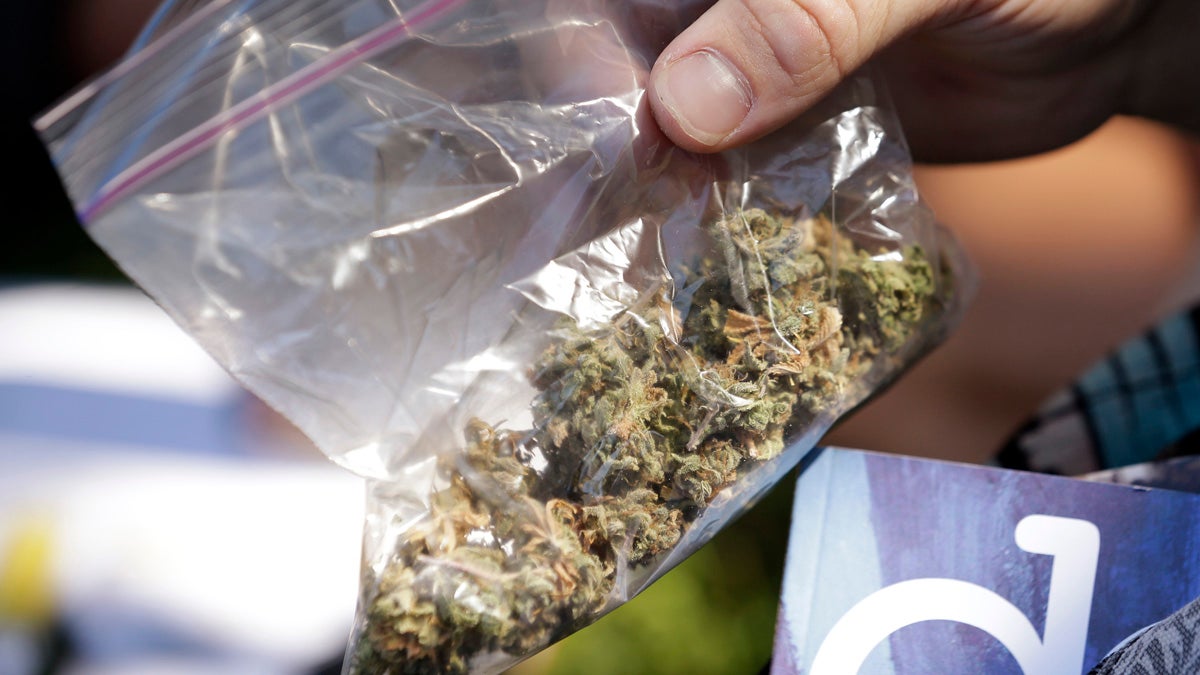Obama still won’t get off the pot

A man pulls out a bag of marijuana to fill a pipe. (AP Photo/Elaine Thompson, file)
Tracking President Obama’s evolution on the marijuana issue is akin to watching paint dry. But you can still see it happening, albeit ever. so. slowly.
Twenty states plus Washington, D.C., have legalized medical marijuana, 17 states (and a number of localities, including Philadelphia) have decriminalized marijuana possession, and two states have legalized possession (with retail outlets for adults opening next year). Which essentially means that, in terms of population, 53 percent of Americans currently live in states that refuse to accept the federal government’s archaic categorization of marijuana as one of the nation’s most dangerous drugs.
Yet Obama apparently has little interest in halting this reefer madness. So says a White House spokesman. Which means that, for the foreseeable future, marijuana will remain a “Schedule 1” drug, as listed by the Drug Enforcement Administration under the 1970 Controlled Substances Act—right up there with heroin and LSD as having “no currently accepted medical use and a high potential for abuse,” and carrying the risk of “potentially severe psychological or physical dependence.” Ranked as less dangerous, in Schedule 2, are cocaine and meth.
The Obama spokesman was asked about this yesterday at a press briefing. With 20 states defying the reactionary DEA, with 52 percent of Americans now saying they support pot legalization (a majority for the first time, according to the nonpartisan Pew pollsters) and 64 percent of independents saying that the feds should leave the states alone, and with CNN medical correspondent Sanjay Gupta (who was once on Obama’s short list for surgeon general) now saying that he endorses marijuana’s medical benefits (“We have been terribly and systematically misled for nearly 70 years in the United States, and I apologize for my own role in that”) … With all that happening, does Obama intend to get off the pot and lead on this issue? Will he push to change the legal classification?
Answer: Not really, with a theoretical dollop of maybe.
Spokesman Josh Earnest’s full response yesterday: “The administration’s position on this has been clear and consistent for some time now, that while the prosecution of drug trafficking remains an important priority, the president and the administration believe that targeting individual marijuana users, especially those with serious illnesses and their caregivers, is not the best allocation of federal law enforcement resources. I looked it up and the president last talked about this in an interview he had with Barbara Walters in December when she asked a similar question. The president acknowledged that the priority, in terms of the dedication of law enforcement resources, should be targeted toward drug kingpins, traffickers and others who perpetrate violence in the conduct of the drug trade … That that is the best use of our law enforcement resources. But at the same time, the president does not at this point advocate a change in the law.”
You can parse that one forever. On the one hand, Obama no longer wants the feds to hassle pot users (and indeed, last week, Attorney General Eric Holder said judges should have more leeway in pot possession cases, so that users are no longer locked up under the federal mandatory minimum laws). Also, on the one hand, Obama wants the feds to prioritize “drug kingpins” and other violent types, presumably instead of targeting medical marijuana people (although, in reality, the feds are still going after a lot of medical marijuana people—spending a reported $300 million on that effort since Obama took office).
But, on the other hand, Obama “does not at this point advocate a change in the law,” a legal reclassification that would remove the onus on weed and would allow the pro-pot states to do their business without threat of federal prosecution. Although perhaps there’s a glimmer of future hope, courtesy of the caveat at this point.
Until pot is removed from Schedule 1, however, the feds still have license to wreak havoc – most notably these days, by targeting the medical marijuana dispensaries. Their woes have been woefully under-reported.
Building on the absurdities of Schedule 1, Congress in 1982 passed a law that unleashes the IRS to go after the dispensaries. The law prohibits “deductions in the trade or business of trafficking in controlled substances.” Translated into English, dispensaries are thus barred from writing off standard expenses like rent and promotion. The IRS, duly empowered under Section 280E of the tax code, has peppered dispensaries with burdensome audits. Worse yet, under federal law, banks can be prosecuted for doing business with the dispensaries. A number of banks in Colorado—the most progressive state on marijuana—won’t allow the dispensaries to open accounts.
What’s interesting, politically, is that the reform effort to muzzle the feds is being led by a conservative Republican congressman, Dana Rohrabacher of California. Working with a number of Democrats, he’s sponsoring the Respect State Marijuana Laws Act of 2013. That would be the first step in reforming the federal tax and banking laws. The bill probably won’t go anywhere—this is the House, after all—but one can glimpse the seeds of a broad bipartisan movement on pot that ultimately links liberals and state’s rights conservatives, a movement that works from the ground up.
It’ll take time. But the medical marijuana dispensaries, and the 750,000 Americans arrested annually for pot possession, would be thankful.
——-
Follow me on Twitter, @dickpolman1
WHYY is your source for fact-based, in-depth journalism and information. As a nonprofit organization, we rely on financial support from readers like you. Please give today.

